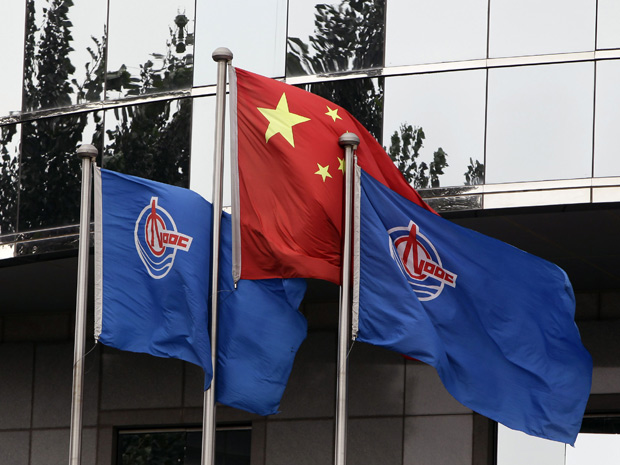
A Chinese Takeover – Not a Private Sector Buyout
Developing Canada’s oil sands brings great promise to the Canadian economy and allows for an opportunity to emerge as a major player in the energy market. The oil that sits unrefined in Alberta opens doors to vast new trade opportunities, which each bring long term benefits. Most importantly, Canada’s oil presents an opportunity to lower fuel prices nationwide and offset some of the tax burden from middle class families to fund the services Canadians cherish. Overall, if exploited wisely by Canada’s private industries and used for the right objectives, Alberta’s oil sands present an opportunity to bring great benefits to this country… Why would you want to give that away?
Perhaps it is a stretch to say that selling Alberta’s private-owned Nexen to China’s state-owned CNNOC for $15.1 billion is a give away but one must consider the ramifications of a 31 year contract with a government overseas that is quickly growing in wealth and power, and is also actively trying to hack into our mainframes, and is notorious for previous takeovers which were quite ugly…
If one thing is clear, Alberta’s oil sector is a wise choice for economic gain, but in the hands of the Chinese government (CNOOC), not only does Canada lose control over it for the next 31 years, Canada can expect to learn how the Chinese do business the hard way. This sale would be a give away of Canada’s oil and the land that it occupies. The deal is a 31 year right of passage for the Chinese government to own a part of Canada. The deal will destroy all of the benefits this sector contained for Canada’s oil markets and for Canadian families from coast to coast to coast.
The Foreign Investment Promotion and Protection Agreement is a very one-sided agreement that gives China unrestricted powers and benefits as Canadians gain nothing. Diane Francis from the Financial Post referred to the agreement in hockey terms as one that “allows only a select few to play on Team Canada on a small patch of ice in China and to be fouled, without remedies or referees. By contrast, Team China can play anywhere on Canadian ice, can appeal referee calls it dislikes and negotiate compensation for damages while in the penalty box behind closed doors.”
In other words, once China is allowed into our country, they will have more power than our companies, bypass laws and deal with legal matters in a secretive manner in courts outside the Canadian legal system. These disputes would be subject to secret arbitration where Canada gets a representative, China gets a representative and the third representative is from the World Bank. In other words China will have a field day taking Canada to the cleaners should they dislike something or should any future government in any jurisdiction in Canada wish to legislate or repeal powers given to the Chinese government with this agreement.
This extends to Chinese purchasing power within Canada. Not only does China now have the leeway to sue the Canadian government if it interferes with the affairs of CNOOC-owned Nexen, it can bypass Industry Canada and purchase other Canadian assets without any foreign investment reviews. This means that China can sit comfortably and take over Canada part by part and every attempt to stop them will end up in a courtroom that favors the Chinese monopoly. Like with Nexen, any Canadian laws that hinder the interest of Chinese-owned assets in Canada are liable for a date at the courthouse at the place of Chinese’ choosing. This would give the country, that is notorious for its record on human rights, the ability to bypass Canadian labor laws, standards, and requirements.
Article 4 of the agreement allows China to bypass any government’s jurisdiction on resource and commercial management which would be deemed unconstitutional. On top of this, the deal is built off of backroom deals and secretive dealings, something uncommon with most modern-day dealings between economic powers. Usually, Canada’s trading partners, notably the United States, offers reciprocal rule of law and grants market access and bases its dealings off of transparency. The Chinese, on the other hand, haven’t given reciprocal rule of law, restricted their markets and is encouraging secretive and corrupt dealings.
The question is, do we want to enter a deal where we have a net loss? Let us not forget that this deal would sell Canada’s oil sector for a net sum, royalties, some taxes and take Canada out of the resource sector while Canada would gain no real room to maneuver in Chinese markets where the Chinese Communist Party has made it clear that it will protect its state-owned and private companies in its markets. For a government supposedly driven by free-market capitalism and democratic principle, it should be clear to them that this deal is not only one-sided, it is a slap in the face of every Canadian who believes in democracy and the free virtue of the markets and the free economy.
Now take this deal and apply it for 31 years, what will happen? Canada will be eaten alive by a growing economic and military power that not only plays by a different rule book, but isn’t keen on caring about ours either. The Chinese are not capitalists, they are communists who have a thirst for beech heads, resource control and economic dominance worldwide. Their poor human rights standards aren’t going to go away soon and they are not fond of the way we do business. It is strange that 31 years was set as a contracted termination/renewal period. Canada’s largest trade deal, NAFTA, needs renewal every 6 months.
It doesn’t help the matter when the Official Opposition is out to lunch on the topic while they should be offering a credible alternative that would be in favor of Canada’s economy while working to stop the bid on the basis of what it actually is. When Green Leader Elizabeth May and Liberal interim leader Bob Rae were asked by Epoch Times reporter Matthew Little if China was under authoritarian rule, they both were capable of responding yes. The NDP’s environment critic – the official environment critic as the NDP are the official opposition, Megan Leslie, said that she’d need to consult her political science textbooks and get briefed before she could give an answer. This says a lot about how strong this new Official Opposition is…
However, looking onto the deal that is set to bundle Canada with gift wrap and bows, to a Chinese regime that won’t play fair and hasn’t in the past, it is worth noting that recent cyber attacks on Canada have been orchestrated by the Chinese government. It is worth summing this deal as a give away and a deal which imprisons Canada for 31 years. It is worth saying that only a government who is fond of communists can accept this agreement as it has no benefit for Canada – instead it acts like a detriment. When Chinese officials have taken Nexen, they will make a clean up, replacing Canadian workers with minted Chinese workers and extracting information from the hierarchy to progressively replace them with Chinese officials. It will be the beginning of the end for Canada’s resource-based economy and the beginning of a period of landmines and traps. The American rejection of a recent attempt at Chinese takeover of a wind farm and both US Presidential candidates’ “tough on China” stances should be enough of an indication on what our neighbors – and largest economic trading partners and allies – will think of the deal.
First marked with the shame of leaking sensitive information to Russian spies, now granting Chinese access to Canadian land and resources with an inherited monopoly won’t sit well for Canada-US relations and won’t sit well for the continued success of NAFTA – especially when both the Canadian population and American government are uneasy with Chinese ownership on North American soil.
Overall, this deal is a bust and Canadians across the country should raise their voices.
So in the end of the day, do you support the Chinese trade deals with Canada?




